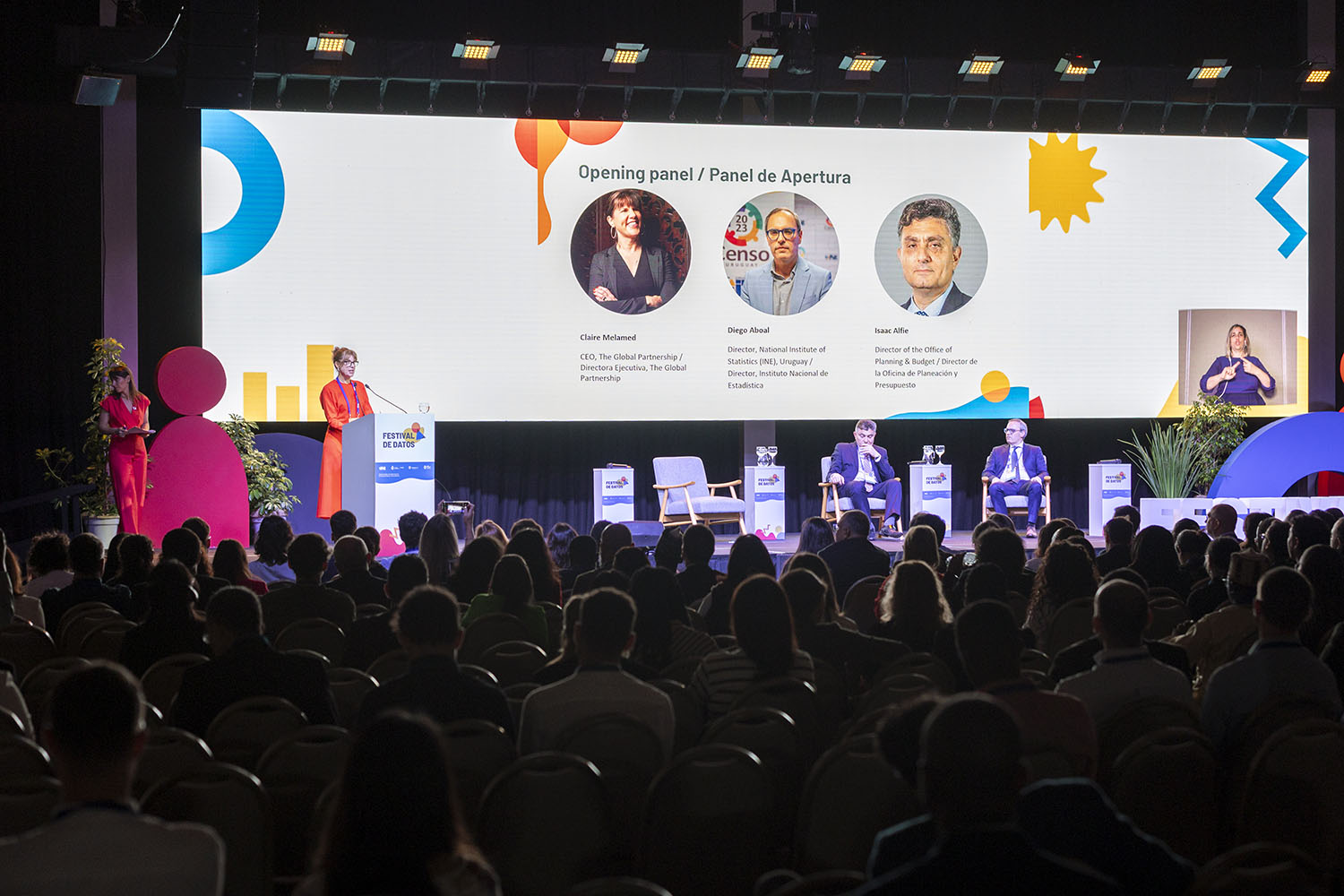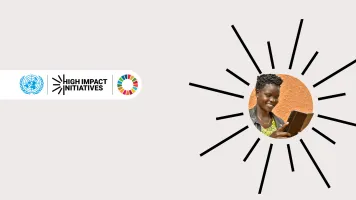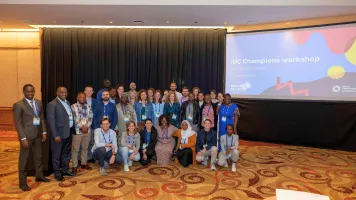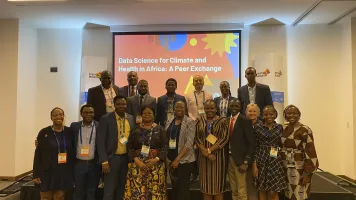It has been an important year for data and development, and for the Global Partnership. In 2023, we launched a new 2024-2030 strategy, and collaborated on key initiatives to unlock the power of data around the world. We are finishing the year filled with hope, determination and purpose following the unforgettable Festival de Datos in Uruguay.
In this blog, we're taking a closer look at some highlights, including a selection of inspiring resources shared, progress on key initiatives, how the Global Partnership network has strengthened and grown, and a peek at what's to come in 2024.
Resources for the data for development community
We published some important new resources this year, to highlight work and share lessons from the network to transform the way data is used and shared.
-
Kicking off the year, we shared an impact story on a collaboration with the Kenya National Bureau of Statistics (KNBS), with findings on how to integrate citizen-generated data for official reporting on Sustainable Development Goals (SDGs).
-
This investment case outlines the economic, social, environmental, and institutional benefits of investing in more and better data, as well as calls to action for stakeholders across sectors.
-
Our Artificial Intelligence Practitioners’ Guide: Kenya, co-developed with the AI community in Kenya, offers practical guidance for those involved in AI-based development and use in the country, and beyond. Topics include the applications of AI, best practices for ethical deployment across major industries, and important regulatory considerations.
-
In March, we published a report looking at the first four years of the Inclusive Data Charter (IDC) initiative. The IDC aims to advance the availability and use of inclusive and disaggregated data, so that governments and organizations can better understand and address the needs of marginalized people.
-
One of the Inclusive Data Charter Champions, the Office of the Chief Government Statistician Zanzibar, has taken a bold, data-driven approach to address the issue of gender-based violence in the nation. This blog takes a closer look at their work.
-
In April, we published Governing data to benefit people: Decision-making that builds trust and accountability. This paper outlines the Global Partnership's thinking on accountable data governance, based on our network of more than 700 partners from academia, the public and private sectors, non-profits, and multi-lateral organizations around the world.
-
Through our partnership with Uruguay’s national statistical office, Instituto Nacional de Estadística, we helped to solve a data management challenge and transform the way information is shared through data visualization. Read about this partnership in English or Spanish.
-
In June, the Global Partnership and D-tree facilitated a peer exchange between the Ministries of Health in Kenya and Zanzibar – both are championing health data governance. This case study shares key lessons, challenges, and next steps.
-
This impact story looks at Paraguay’s inspiring work on developing a system for sharing data to manage the country’s water resources more effectively.
-
This report examines how to design effective learning platforms for the data for development community, what motivates learners, and the barriers they face.
-
Finally, in a large effort involving more than 50 stakeholders, the Global Partnership collaborated with Chief Statisticians from the United Nations System, ETH Zurich, and national partners to report on the state of global SDG data and map opportunities for progress. Download the Pulse of Progress report.

Claire Melamed, Global Partnership CEO, kicks off the opening ceremony at Festival de Datos. Photo by Pablo Kreimbuhl.
Unlocking the power of data for all
Better data will be critical to achieving the Sustainable Development Goals (SDGs). This year, we’re halfway through the Goals and a lot of ours and our partners’ work is focused on getting there.
-
The Global Partnership’s new 2024-2030 strategy was launched in November. The strategy is built on three pillars: make inclusion the norm, putting people at the center of data production, sharing and use; strengthen national data systems for timely decision making; and shape how data is governed to ensure it is accountable to those whom it is intended to serve.
-
In September, we convened a fantastic group of speakers and partners to launch the Power of Data High Impact Initiative at UN HQ in New York. The aim is to create 30 National Data Partnerships by September 2024, to unlock new data sources, technologies, and investment to achieve the SDGs. Just over six weeks after the launch, the first steps towards making these partnerships a reality were agreed at Festival de Datos. Watch the launch video for the High Impact Initiative:
-
Also in September, we celebrated the first birthday of the Data Values Movement, which aims to unite people around the world in advocating for a fair data future for all. More than 600 organizations have joined the movement, and more than 100 countries have been involved so far. Learn about the work of our Data Values Advocates in the video below, and sign up to the Data Values Digest for the latest from the campaign.
- In November, the network came together in beautiful Punta del Este, Uruguay, for the exhilarating Festival de Datos. With sessions ranging from the youth takeover plenary, timely debates on the future of AI and inclusive data, and so much more, new and existing partners left with fresh perspectives and connections of their own.
Strengthening the network
The Global Partnership network has grown to 700+ partners, an increase of six percent since the beginning of the year, and we've collaborated on key initiatives to unlock the power of data around the world.
Several new partners have been onboarded since the closing of the Festival, including Red Dot Foundation and AbortionData Collective, along with ministries from Costa Rica and the Democratic Republic of the Congo.
Outside of Festival de Datos, the network has continued to grow not only in numbers but also in scope, whether it is increasing partnerships surrounding AI with organizations like Amini, or solidifying government relationships across Latin America and the Caribbean. These new relationships will help to support the 2024-2030 strategy and vision of a fair data future for all.
This is only the beginning of how partnerships will be utilized and formed during the Global Partnership’s next strategic period.
What’s next? A few things to look out for in the coming months
- In August, we completed a three-month virtual training program on data science and the intersection of climate and health – delivered by our partner, the African Population and Health Research Center – as part of the Capacity Accelerator Network (CAN) program. Stay tuned for an update on this program, and to meet our eight new CAN fellows and hear about their work.
- Sightsavers – one of the Inclusive Data Charter (IDC) Champions – has recently launched a new Inclusive Data Charter Action Plan, outlining its renewed commitment to the IDC, how the organization will improve its collection, analysis, and use of inclusive data and make it a priority across its work. We’ll be sharing more about this work in the new year, as well as insights from the first five years of the IDC program.
- Plus, more resources for the data for development community, stories of impact, and perspectives will be shared.
We are feeling ambitious about 2024 and beyond, and are excited to push the power of data with our network and partners.
We look forward to all the work we’ll collectively be doing to drive data in development in the next year.
Main photo credit: The youth takeover plenary at Festival de Datos, by Pablo Kreimbuhl.







